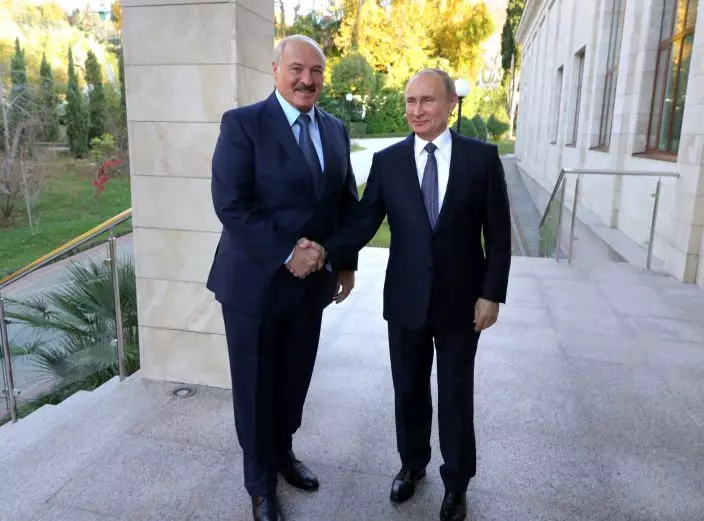The presidents of Belarus and Russia met Friday to discuss deeper economic ties between the two close alliesamid mounting concerns in Minsk that Moscow ultimately wants to subdue its neighbor.
The meeting in St. Petersburg is the second encounter between Russian President Vladimir Putin and his Belarusian counterpart Alexander Lukashenko this month.
Officials said the two nations are edging closer to agreements on how to integrate their economies further.

Russian President Vladimir Putin, right, and Belarusian President Alexander Lukashenko shake hands during their meeting in the Black sea resort of Sochi, Russia, Saturday, Dec. 7, 2019. Leaders of Russia and Belarus sat down for talks Saturday on deepening ties between the two allies — a meeting that triggered a protest in the Belarusian capital. More than 1,000 opposition demonstrators rallied in Minsk to protest closer integration with Russia, which they fear could erode the post-Soviet independence of the nation of 10 million. (Mikhail Klimentyev, Sputnik, Kremlin Pool Photo via AP)
Greeting Lukashenko at the start of Friday's talks, Putin said some progress on resolving outstanding issues has been made.
The negotiations have triggered opposition protests in Belarus, where many fear that closer ties with Russia could weaken Belarus' independence.
Putin, who marks two decades in power later this month, remained coy about his political future after his current term ends in 2024.

Russian President Vladimir Putin, right, talks to Belarusian President Alexander Lukashenko, left, during a meeting in St. Petersburg, Russia, Friday, Dec. 20, 2019. The presidents of Russia and Belarus are holding talks on expanding ties between the two ex-Soviet neighbors and allies. (Mikhail Klimentyev, Sputnik, Kremlin Pool Photo via AP)
Hedodged a question Thursday if he could potentially extend his rule by shifting into a new governing position to become the head of a union between Russia and Belarus.
Russia and Belarus signed a union agreement in 1997 that envisaged close political, economic and military ties, but stopped short of forming a single nation.
Lukashenko, who has ruled Belarus for more than a quarter-century with little tolerance for dissent, relies on cheap Russian energy and loans to shore up his country's Soviet-style economy.
The Kremlin has recently raised pressure on Belarus, increasing energy prices and cutting subsidies. Russian officials say Minsk should accept closer economic integration if it wants to benefit from lower energy prices.
In an apparent bid to win concessions, Lukashenko on Friday emphasized Belarus's role as Russia's military ally and security partner, an argument he has used repeatedly in the past to get more subsidies from Moscow.
“We have created a single defense space and our security agencies gave worked in close contact,” Lukashenko told Putin at the start of their talks.
But the Russian president has signaled that such tactics won't work. He argued that Belarus can't get Russia's domestic prices for its oil and gas unless it agrees to closely coordinate economic and financial policies and create interstate structures.
“It's a huge work, and it can be done only if there is a political will shared by both sides,” Putin said at his annual news conference Thursday.


